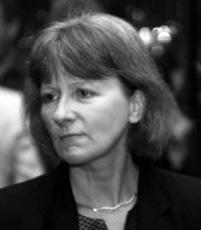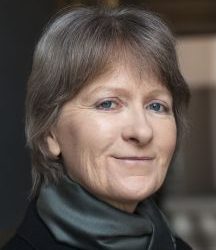It is with profound sadness that colleagues and students past and present have learned of Professor Mary Bryden's death at St. Wilfrid's Hospice in Eastbourne on 5 November 2015 after a three year long battle against cancer. Mary was a treasured colleague, mentor and friend to many in both the University and beyond and will be sorely missed.
To read more about her life and work, see Professor James Knowlson's tribute below.
Professor Mary Bryden (1953-2015)
An Obituary by James Knowlson (Emeritus Professor of French Studies)
 Her former colleagues and many friends in the university were sad (and many devastated) to learn that Katherine Mary Bryden, Emeritus Professor of French Studies at the University of Reading, died in St. Wilfrid's Hospice in Eastbourne on 5 November 2015 at the early age of 62, after a three year long battle against cancer. No-one could possibly have fought harder against that cruel disease than Mary did.
Her former colleagues and many friends in the university were sad (and many devastated) to learn that Katherine Mary Bryden, Emeritus Professor of French Studies at the University of Reading, died in St. Wilfrid's Hospice in Eastbourne on 5 November 2015 at the early age of 62, after a three year long battle against cancer. No-one could possibly have fought harder against that cruel disease than Mary did.
She had a richly varied life and a very distinguished scholarly career. She was born on 9th September 1953 and attended Eastbourne High School for Girls from 1964 to 1971. She came to the University of Reading to study for an Honours Degree in French in 1971. After graduating in 1975, she did a Final Diploma of the Institute of Linguistics (French) in 1977 and an M. A. in Modern Languages at Salford University from 1980 to 1982.
She entered university teaching relatively late, after teaching for over a decade at tertiary level (with an RSA Diploma in Teaching English as a foreign language to adults) and a spell in administration as the Personal Assistant to the Vice-Chancellor of Aston University, where she also met her future husband, Ray Loveridge, Professor in Manpower Studies and Head of the Strategic Management Division and Director of Aston Business School Research Institute. The Vice-Chancellor, Sir Frederick Crawford wrote in a personal communication to me on 19 November: 'She was outstanding in her loyalty, discretion and dependability, but in parallel with that she was determined to establish herself in Academe; she devoted much, if not all, of her leisure time to building the foundations of the distinguished career that was to follow, particularly as a specialist on [Samuel] Beckett.'
After 12 years, she returned to Reading in 1987 on a French Department Studentship to do a Ph. D. on Beckett, one of the main areas of what was to be her future work. While pursuing her research on 'Women in Samuel Beckett's Prose and Drama: Her Own Other' (which became her first book), she also became Beckett Research Fellow, working part-time in the Library's Beckett Archive, later becoming Associate Director of the Beckett International Foundation. She was appointed to a Lectureship in French Studies in 1995, promoted to Senior Lecturer two years later, then moved to a Chair of European Literature at Cardiff University in 2003 until 2007, at which date she returned to Reading as Professor of French Studies. She occupied many different roles in Reading: Head of the Department of Modern Languages and European Studies; School Director of Research; Co-Director of the Beckett International Foundation. Nationally she was Vice-President of the Association of University Professors and Heads of French (AUPHF), and its President from 2010-13. She was also President of the international Samuel Beckett Society from 2003 to 2005, and a member of the Arts and Humanities Research Council Peer Review College from 2006 to 2014. She held visiting appointments at Newnham College, Cambridge and at Magdalen College Oxford, was external examiner in the Universities of Manchester, Cardiff, Exeter, Oxford, Nottingham, Cambridge, Bristol and examined PhD theses at the University of Northumbria (2014) and Paris VIII (2015).
For someone who was shy, quiet and retiring by nature, she was remarkably self-assured and determined to be actively involved in a wide range of national and international conferences, keynote lectures and broadcasts. She travelled widely and gave talks in the USA, Canada, France, Germany, Greece, the Czech Republic and especially Japan, where she had many close academic friends. Her media work included many live and recorded interviews on aspects of Samuel Beckett with BBC Radio 3 'Nightwaves', 'Music Matters', and 'Ill Said Ill Sung''; BBC Radio 4 'Woman's Hour'; BBC Radio Ulster Sunday religious affairs programme and Australian ABC Radio.
Her research specialities lay chiefly in the sphere of twentieth-century French literature, philosophy, and culture and she worked intensively (and, one should add, published prolifically) on Samuel Beckett, Gilles Deleuze, Hélène Cixous, T. E. Lawrence and Thomas Merton. Her books includedWomen in Samuel Beckett's Prose and Drama (mentioned earlier), Samuel Beckett and the Idea of God (1998), Deleuze and Religion (2001), Gilles Deleuze: Travels in Literature (2007), Beckett's Proust/Deleuze's Proust (2009) ) (jointly with M. Topping), ) and a number of edited books Samuel Beckett and Music (1998), Beckett and Animals (2013). She also wrote about a hundred essays, articles and reviews on a wide range of topics, although the work of Beckett remained central to her writing. She also wrote creatively from time to time and won a BBC short story competition.
Mary was diagnosed with a malignant tumour in 2012 and she took early retirement because of her illness in October 2013. However, even after the diagnosis, she still applied for and accepted a full-time Fellowship at the Institut d'Études Avancées in Paris, working on a research project on the literature of the First World War.
But such a listing of her written work and her academic appointments, while important in demonstrating her intellectual ability, determination and sheer hard work, gives little real sense of Mary's range of interests and her personal qualities. Her strong Catholic faith (which did not affect her objectivity when she wrote about the work of a profound agnostic like Samuel Beckett) and her musical abilities and activities are, for example, central to an understanding of her life. This was closely associated with her spiritual and liturgical concerns. Outside of academic life, she was involved with church groups, mainly as animateur in producing and writing music for small groups of young church musicians. Many of these attributed their later career development as musicians, actors or even priests to their involvement in such groups. She was the kindest and most generous of friends, had a lovely sense of humour and was extremely popular with both colleagues and students (whom she was always willing to help). She was admired and liked internationally as well as nationally.
Supervising her PhD thesis and working alongside her later in the Beckett International Foundation was for me a sheer delight. In the forty years I knew her, I never heard her say a single harsh word about anyone. Total honesty and integrity characterised every aspect of Mary's life.
An event commemorating Mary's life took place on Saturday 5th November 2016 at the University of Reading as part of the University's annual 'Beckett Week'.

